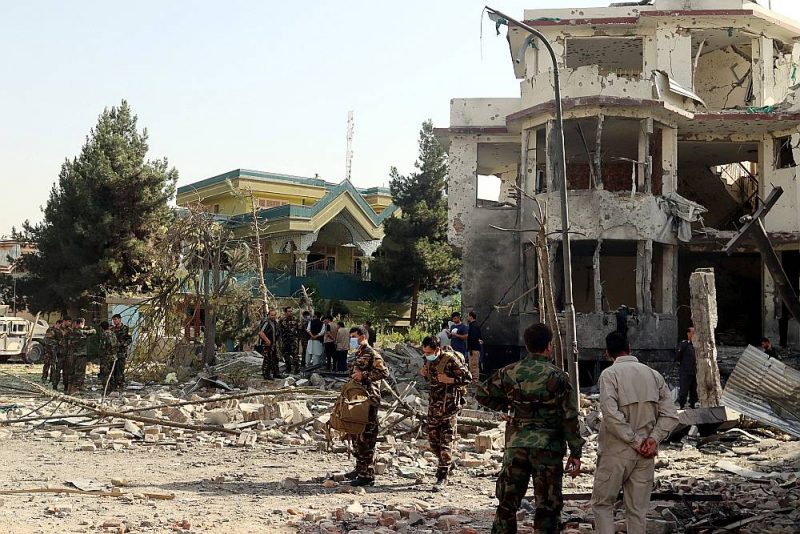Viesturs Sprūde, “Latvijas Avīze”, JSC “Latvijas Mediji”
The decision by the United States and Britain to withdraw troops from Afghanistan has encouraged the Taliban to step up their attack campaign in recent weeks, not only by controlling rural areas but also by trying to capture larger cities.
–
The news
The former Minister as Queen – for taxpayers’ money parties, travel and a driver for six children’s groups! Egils Līcītis columnet
12 hours
–
The news
“Good word, my whole life ran through my eyes that morning! ” Social networkers are moved by the story of Madara, a mother of two, about fighting a coward
1 day
–
The news
“Doctors have been bribed and lie. ‘There has been real anarchy because people no longer believe in anything.’ Belte on the crisis of credibility
23 hours
–
In Europe, this has raised concerns about a new refugee crisis. In April, when Washington announced the withdrawal of troops, Islamic fundamentalists controlled 77 of Afghanistan’s 407 provinces, and on August 1, 223 provinces were already in Taliban control and 116 provinces were fighting, while the government controlled 68 regions.
Fierce battles are still taking place over several major cities, in the southern part of the country, in the Helmand provincial capital of Lashkargah, nearby Kandahar and Herat in northwestern Afghanistan.
The fate of salmon
On Tuesday evening, the house of Defense Minister Bismillas Mohammadi was attacked in a government quarter surrounded by checkpoints and fencing in the capital. The minister himself was not in it.
Five assailants detonated explosives placed in the car near the minister’s house, then tried to break into the building and fire it from the apartment of an Afghan parliamentarian next door.
A few hours later, other explosions and shootings were heard. The minister’s family was evacuated, but at least four assailants who attacked Mohammadi’s residence were killed. Twenty people, including several of the minister’s guards, were injured. The total number of killed is eight.
The Taliban have claimed responsibility for the attack, threatening to continue “retaliatory” attacks on Afghan government officials.
Fierce battles are being fought these days over the large administrative center of Hashandand’s 200,000-strong administrative population in Lashkargah, which until recently was under British rule.
Hundreds of families are leaving it, settling on the banks of the Helmand River for the time being. The Afghan army has called on the population to evacuate as soon as possible to facilitate military operations in the city, where several districts and a TV station are already in Taliban hands.
Earlier in the week, the Taliban managed to approach the prison, but government forces pushed the attackers back. The most important prisoners have been evacuated from prison, but some remain. US and Afghan military aviation provide support from air government forces.
“The corpses are tossed in the streets. We don’t know if they are Taliban or civilians, “a witness told the BBC’s Afghanistan from the battlefield. Another admitted that it was not clear where to flee, because “shoot on every corner”.
During the street fighting, the Taliban are taking positions in apartments and shops, but residents will not dare to take to the streets to avoid crossfire. From time to time, warring parties through loudspeakers invite people to leave their homes, giving it just a few minutes.
If Salashargah were to fall, it would be the Taliban’s greatest success since the attacks began in May, with a great inspiring effect.
In an interview with the BBC, General Sami Sadat, who is leading the defense of Lasherargah, emphasized that the outcome of the fighting in the city and in Afghanistan as a whole was not limited to one country: “[Talibu uzvara] will encourage the mobilization of small groups of extremists in European and American cities. This will have a devastating effect on global security. This is not a war for Afghanistan, this is a war between freedom and totalitarianism. “
Along with Helmand province, the government would also lose an important agricultural area. Laskargagh is also strategically important, with a number of motorways, including the highway between Kandahar and Herat, where there are currently controversial battles.
The government claims that the Taliban have been expelled from several parts of Herat, while the Taliban say the army and militants of the influential local leader Ismail Han have “escaped”.
Concerns about refugees
Afghan Foreign Minister Mohammad Hanif Atmar said on Tuesday that more than 3,000 people have lost their lives across the country since the start of the Taliban offensive. About 300 thousand have fled.
The latter is causing unrest in Europe, where there are fears that the radical conservative Taliban will prevail in a recurrence in 2015/2016. The flood of Syrian and Libyan refugees in 2006, when Europe had to take in more than a million migrants.
Only this time they would come from Afghanistan. For the time being, the escape of people intimidated by the Taliban’s success mainly affects neighboring countries. Many cross the Iranian border across the mountains, some then looking for accommodation in Turkey or trying to enter Europe through it.
Poor Tajikistan also estimates that it may have to take in up to 100,000 refugees, who are already crossing the border in small groups. Uzbekistan is facing a similar situation.
Austrian Chancellor Sebastian Kurz was the first of the Western leaders to talk about the possible problem at the end of July.
In an interview with the German edition of Bild, he emphasized that in the event of the appearance of Afghan refugees, it would not be right for the European Union (EU), as in 2015, to try to solve the problem only at the expense of Austria and Germany.
Kurz urged a timely decision at EU level on whether people who would come from Afghanistan in the event of a change of power would be allowed to seek asylum.
Observers have doubts as to whether Europe will be better prepared for a new refugee crisis this time around, but it is very likely that every effort will be made to keep Afghan refugees in Afghanistan’s neighborhood rather than moving forward.
Themes
–


